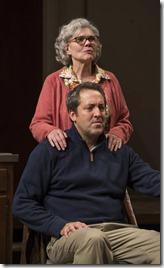
Thoughtful world-premiere explores end-of-life issues
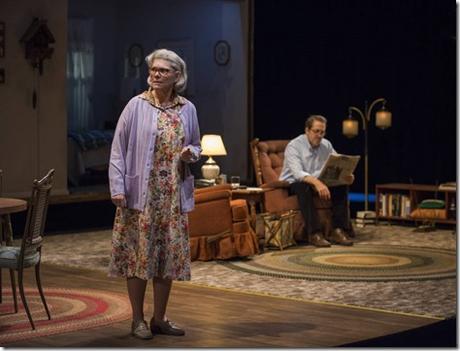
Those of us who have had parents in the stage of their lives where they worry about their health rather than work and maintain a limited activity schedule will recognize this sort of a visit - the middle-aged child taking time away from their own family, career and routine to make an obligatory visit to the aged parent. A visit that, while not resented, is difficult. It's hard to make conversation and so one relies on television to fill the void and goes to bed early. In this world premiere play by the 76-year-old David Rabe, middle-aged son
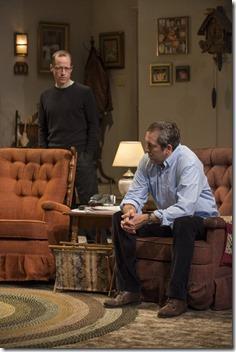
Conversation topics are of the usual variety - projects the son can help with (i.e. balancing Mom's checkbook), doctor visits, family statuses, the "why don't you call more" statements. Rabe and this artistic team of director Anna D. Shapiro and actors Barford and Monk capture this all in convincing naturalism to the point that it at first seems time is creeping by as slowly as it does in such a visit. The early ennui, though, is broken up by some very non-realistic devices of depicting the television and Edna's cancer as characters, played by Sally Murphy and , respectively. Yes, Murphy is "Television" as she explains to the audience in the play's opening monologue. And not just a TV set, but the medium itself - an omnipresent, ever comforting friend providing relief from real connection to the other person in the room. Murphy plays the role with a seductive sweetness that can show anxiety while being turned off or mild resentment at being left on all night. - an automaton with something resembling human feelings, but not quite possessing them. Hopper's "Cancer" is similarly deceptive. He's smooth and charming even as he is killing Edna. Like a con man befriending his mark before cheating her out of everything she owns. While Rabe's device of humanizing an inanimate object and an amorphous entity like cancer cells threatens to be pretentiously theatrical, before long the intention becomes completely apparent. The TV and the cancer are ever present in Edna's life. "Television" is on one level just furniture, but at a deeper level it brings the world into Edna's apartment. "Cancer" is like a roommate. As a person with reduced mobility Edna spends most of her time at home and thus the TV is as present in her life as her cancer. The remarks they make reflect thoughts she would have. This theatrical trick allows the playwright and cast to take us into Edna's mind while breaking what might otherwise be monotonous action.
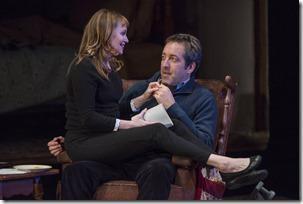
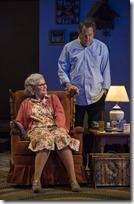
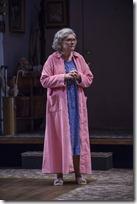
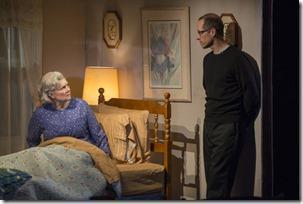
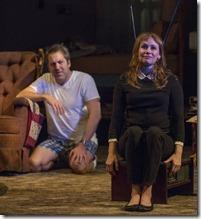
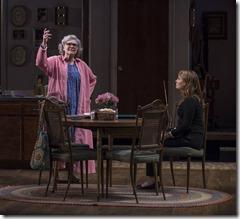
As the play progresses we learn more about Edna, whose husband died in an auto accident not too many years prior. She reflects on her life, trying to resolve resentments and regrets that can't be resolved: the parents who favored her difficult older sister over her, the way they raised Andrew, her own life choices. Monk, who I had known mostly for her comic roles, is a revelation here, perfectly capturing the spirit and pain of her character. She wants to appear upbeat but is internally sad. Echoing her "Cancer," she wants to live. She wants to appear independent and not a burden and is thus hesitant to ask for or accept help. It's a marvelously nuanced performance and, I would predict, one of the best we'll see in Chicago this season. Rabe doesn't tell us much about Andrew or his life. He seems, at least here, to have inherited his mother's conflict avoidance. Mostly Rabe keeps him as an everyman, and Barford skillfully fleshes him out to seem a real, if unremarkable, person.
Life's closing years for those fortunate enough to live long ones are ironically filled with challenges: loss of loved ones, of health and mobility. And on top of this, recognizing the reality that the end is near. It's not the stuff of a fun-filled night at the theater, but the topic is coming for us all. This is an important play in the way it helps us understand those who are in later stages of life and to prepare ourselves for it.
Visiting Edna continues through November 6th at Steppenwolf Theatre, 1650 N. Halsted (map), with performances Tuesdays 7:30pm, Wednesdays 2pm & 7:30pm, Thursdays/Fridays 7:30pm, Saturdays 3pm & 7:30pm, Sundays 3pm. Tickets are $20-$89, and are available by phone (312-335-1650) or online through their website (check for half-price tickets at Goldstar.com ). More info at Steppenwolf.org. (Running time: 2 hours 40 minutes, includes an intermission)
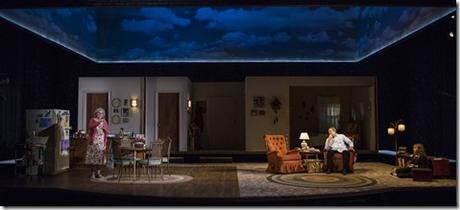
behind the scenes
Anna D. Shapiro (director), (scenic design), Linda Roethke (costume design), Gabrielle Layla (asst. costume design), Marcus Doshi (lighting design), Alexander Ridgers (asst. lighting design), Rob Milburn and Michael Bodeen (sound design, original music), Polly Hubbard (dramaturg), Gigi Buffington (company vocal coach), Penny Lane Studios (wig and hair design), Jonathan Berry (artistic producer), Tom Pearl (director of production), JC Clementz, Tom Dickson (casting), Christine D. Freeburg (stage manager), Brian Maschka (assistant stage manager), Christina Gorman (fight consultant), Dana Nestrick (wing development and build), Gianna Petrosino (stage manager apprentice), Michael Brosilow (photos)
Tags: 16-0953, Alexander Ridgers (asst. lighting design), Anna D. Shapiro (director), Ashlyn Hughes, Brian Maschka, Chicago Theater, Christina Gorman, Christine D. Freeburg, Dan Stearns, Dana Nestrick, David Rabe, David Zinn (scenic design), Debra Monk, Diane Dorsey, Gabrielle Layla (asst. costume design), Gianna Petrosino, Gigi Buffington, Ian Barford, JC Clementz, Jeremy Sonkin, John Olson, Jonathan Berry, Linda Roethke (costume design), Marcus Doshi (lighting design), Michael Brosilow, Michael Rabe, Penny Lane Studios, Polly Hubbard, post, Rob Milburn and Michael Bodeen, Sally Murphy, Steppenwolf Theatre, Tim Hopper, Tom Dickson, Tom Pearl

